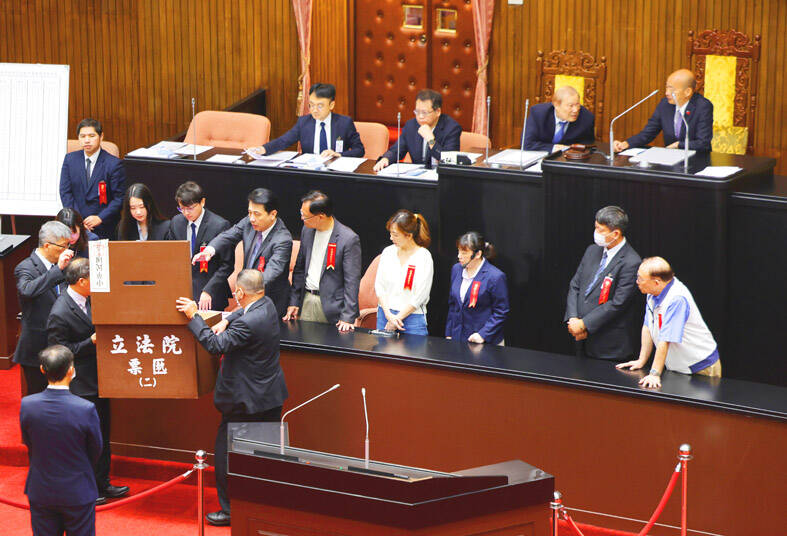Opposition lawmakers have again voted down all seven of President William Lai’s (賴清德) nominees for the Constitutional Court, a decision that would further prolong the court’s paralysis.
Among the seven nominees, five, including veteran prosecutor Tsai Chiu-ming (蔡秋明) and Supreme Court judge Su Su-e (蘇素娥), who were also nominated to serve as president and vice president of the Judicial Yuan, were rejected solely by opposition Chinese Nationalist Party (KMT) and Taiwan People’s Party (TPP) lawmakers.
The KMT and TPP hold a combined majority in the legislature, meaning no nomination could be confirmed without their support.

Photo: CNA
Several Democratic Progressive Party (DPP) lawmakers also joined the opposition in voting down legal academics Chen Tsi-yang (陳慈陽) and Chan Chen-jung (詹鎮榮).
KMT Legislator Wu Tsung-hsien (吳宗憲) said that the party’s caucus had decided to reject all the nominees, because they lacked “the courage to say no to the ruling party.”
KMT Legislator Weng Hsiao-ling (翁曉玲) called on Lai to consult with opposition lawmakers the next time he nominates justices.
Meanwhile, TPP Chairman and legislative caucus whip Huang Kuo-chang (黃國昌) said that his caucus would not accept nominees with partisan leanings, adding that the nominees failed to meet the caucus’ review standards, including whether they could uphold the spirit of the Constitution, safeguard human rights and the spirit of democracy, and maintain independence and have the courage to say “no” to those in power.
The nominees had been selected by Lai in March to fill vacancies on the Constitutional Court, which was his second attempt, after the legislature rejected his initial round of nominees in December last year.
The opposition last year said that Lai’s nominees, submitted without consulting opposition lawmakers, were biased toward the DPP.
The outcome further deepens the deadlock in the Constitutional Court, which is currently unable to hear or rule on cases due to a measure passed by KMT and TPP lawmakers in December last year requiring a quorum of 10 justices for adjudication.
The Constitutional Court normally has 15 justices, but it currently has only eight, following the departure of seven justices whose eight-year terms ended on Oct. 31 last year.
The court serves as a check on the executive and legislative branches. It has the authority to resolve disputes between government bodies, impeach presidents and determine whether laws contravene the Constitution.
For people who believe their constitutional rights have been infringed, the court serves as the final avenue for redress.
Landmark rulings by the court in recent years include restricting the use of the death penalty, granting equal marriage rights to same-sex couples and decriminalizing adultery — decisions that have sometimes drawn criticism from conservative groups.
In response, Presidential Office spokesperson Karen Kuo (郭雅慧) said that Lai found the result "very regrettable and concerning."
Kuo said yesterday's vote left the Constitutional Court without the minimum number of justices to function, undermining public access to constitutional redress and placing Taiwan's democratic and constitutional system under an unprecedented challenge.
She called on "both the ruling and opposition parties" to work together to restore the normal functioning of the court, but did not say what steps the president plans to take next or why he had not consulted with opposition lawmakers on the nominees to begin with.

MAKING WAVES: China’s maritime militia could become a nontraditional threat in war, clogging up shipping lanes to prevent US or Japanese intervention, a report said About 1,900 Chinese ships flying flags of convenience and fishing vessels that participated in China’s military exercises around Taiwan last month and in January last year have been listed for monitoring, Coast Guard Administration (CGA) Deputy Director-General Hsieh Ching-chin (謝慶欽) said yesterday. Following amendments to the Commercial Port Act (商港法) and the Law of Ships (船舶法) last month, the CGA can designate possible berthing areas or deny ports of call for vessels suspected of loitering around areas where undersea cables can be accessed, Oceans Affairs Council Minister Kuan Bi-ling (管碧玲) said. The list of suspected ships, originally 300, had risen to about

DAREDEVIL: Honnold said it had always been a dream of his to climb Taipei 101, while a Netflix producer said the skyscraper was ‘a real icon of this country’ US climber Alex Honnold yesterday took on Taiwan’s tallest building, becoming the first person to scale Taipei 101 without a rope, harness or safety net. Hundreds of spectators gathered at the base of the 101-story skyscraper to watch Honnold, 40, embark on his daredevil feat, which was also broadcast live on Netflix. Dressed in a red T-shirt and yellow custom-made climbing shoes, Honnold swiftly moved up the southeast face of the glass and steel building. At one point, he stepped onto a platform midway up to wave down at fans and onlookers who were taking photos. People watching from inside

Japan’s strategic alliance with the US would collapse if Tokyo were to turn away from a conflict in Taiwan, Japanese Prime Minister Sanae Takaichi said yesterday, but distanced herself from previous comments that suggested a possible military response in such an event. Takaichi expressed her latest views on a nationally broadcast TV program late on Monday, where an opposition party leader criticized her for igniting tensions with China with the earlier remarks. Ties between Japan and China have sunk to the worst level in years after Takaichi said in November that a hypothetical Chinese attack on Taiwan could bring about a Japanese

The WHO ignored early COVID-19 warnings from Taiwan, US Deputy Secretary of Health and Human Services Jim O’Neill said on Friday, as part of justification for Washington withdrawing from the global health body. US Secretary of State Marco Rubio on Thursday said that the US was pulling out of the UN agency, as it failed to fulfill its responsibilities during the COVID-19 pandemic. The WHO “ignored early COVID warnings from Taiwan in 2019 by pretending Taiwan did not exist, O’Neill wrote on X on Friday, Taiwan time. “It ignored rigorous science and promoted lockdowns.” The US will “continue international coordination on infectious